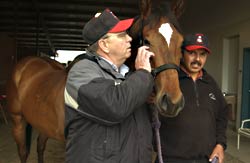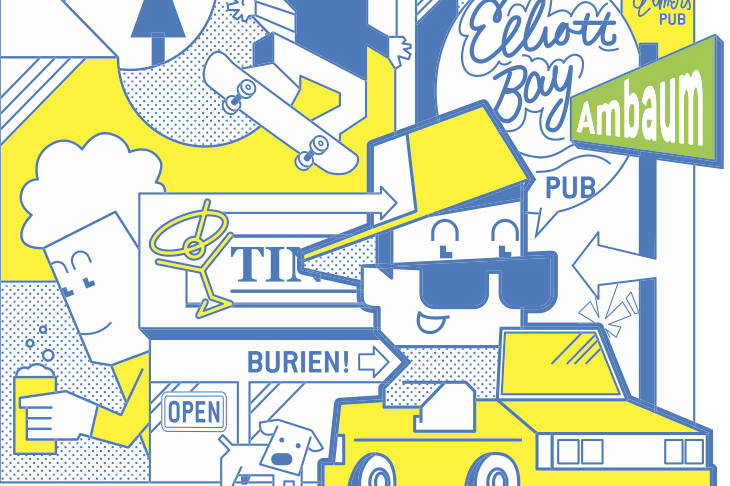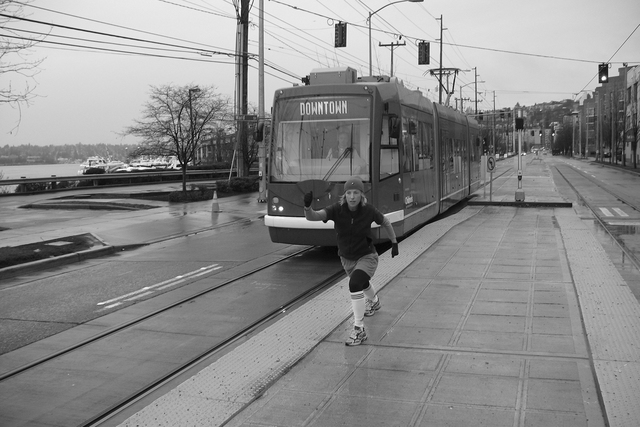At 5 p.m. two Fridays ago, while many Seattleites hoisted water bongs in celebration of the unofficial 4/20 holiday, a thirsty pack of rich old people gathered in the Triple Crown Suites on the sixth floor of the Emerald Downs grandstand in Auburn. One woman, wearing tinted gold bifocals with her hair dyed a peculiar shade of orange, guzzled bourbon and vocally celebrated the fact that the horse she owned was about to go off at 14-1 odds. Near the hosted bar, a molten chocolate-fondue fountain cascaded next to a faux palm tree, with bite-size pieces of fruit beckoning patrons to take a dip.
During the same hour, 30 Mexican nationals toted their belongings into spartan dormitories on the track’s backstretch, where trainers Howard Belvoir and Kay Cooper were readying their runners for opening night. The Mexicans, arriving two-and-a-half months later than usual to serve as hands-on caretakers for the horses (grooms, in racing parlance, who wash, feed, and walk horses, among other duties), “were sucked up like a dry sponge” by employers like herself, Cooper says.
The Mexican grooms were late because of an unprecedented holdup in the processing of their temporary work visas by the U.S. Department of Labor, a cataclysmic confluence of increased migrant demand, budget shortfalls, and bureaucratic speed bumps. The delay left trainers like Belvoir and Cooper breaking their backs and scrambling for help in the run-up to opening night—to the point where they couldn’t prep their normal volume of Thoroughbreds.
“[The Mexican grooms] were supposed to be here Feb. 1,” says the 62-year-old Belvoir, one of the track’s top trainers. “I was working 6 [a.m.] to 6 [p.m.] menial labor, which is tough for an old man. You would have had a much stronger field of horses had [the grooms] been here on Feb. 1.”
“A lot of horses didn’t get trained because there weren’t enough personnel to do it,” seconds Cooper, who reports that last weekend’s field was considerably thinner than in years past.
The local Mexican groom shortage was first reported in brief by Dennis Dodge of the Daily Racing Form, but the delay’s repercussions aren’t exclusively local—nor are they restricted to the horse-racing industry. All along the Eastern seaboard, restaurant and resort owners have been hammered by similar delays (H2B visas are issued to the majority of guest workers who don’t work in agricultural trades), wrought in large part by the Department of Labor’s recent decision to consolidate their visa processing from six regional offices to two hubs in Chicago and Atlanta, a maneuver the agency insists will pay off over the long haul.
“We believe [two regional centers] makes it more efficient,” says DOL spokesperson Peggy Abrahamson. “But definitely the amount of [H2B visa] applications has increased over the years, while the budget has decreased. [Processors] are being more careful; and sometimes people don’t send in exactly the right stuff.”
Horsemen in equine hotbeds like Florida and Kentucky have experienced struggles similar to Emerald’s, according to Joe Santana, president of the national Horsemen’s Benevolent and Protective Association. “There is a shortage of help on our backside,” adds Phil Combest, vice president of the Florida HBPA. “My night guy has been stuck in Mexico for five months now.”
Congress is not blind to the issue, says Santana. The bipartisan-sponsored STRIVE bill currently being considered by the U.S. House of Representatives would create a new three-year H2C visa classification (H2B visas have to be renewed each year) for nonagricultural workers—a classification which includes the indispensable Mexican groom—that would raise the alien permit cap from 66,000 to 400,000 and allow workers to apply for a green card after five years.
Juan Rodriguez has worked at Emerald Downs as a groom in the stable of Cooper and her father, Jim Penney, for the past three meets. His brother is a groom on Howard Belvoir’s shed row. The Rodriguez brothers both live in dormitory rooms on the track’s backstretch. “It’s good,” says Juan of the accommodations.
In the off-season, he returns home to his family in Guadalajara, Mexico. Like so many of his countrymen, his return to the track was stymied by the mysterious H2B visa delay. “I applied for the visa,” he says. “I don’t know what happened. I don’t know what’s up.”
The panic over the Mexican groom shortage ushers to the fore a noisy band of hypocrites within America’s capitalist machine: unemployed citizens who decry job shortages yet don’t have the temerity to start at ladder’s bottom. And it also hints at a hazardous chink in the Thoroughbred industry’s long-term armor.
“There are no white people who want to work, and [the Mexican grooms] love their jobs,” says trainer Belvoir, who’s Caucasian. “White people don’t want to work; they just want to bitch and say there are no jobs. We had [the groom jobs] posted in the paper from December on because of immigration, and got maybe two people.”
Actually, they got zero, according to local HBPA head Mary Ann O’Connell, who confirms that the track anticipated the visa delay, to no avail. “We do everything to try to get Americans to work in our industry,” she says, “but the fact is, if you’re not into horses, you’re not really attracted to the industry. Out of $6,000 worth of advertising [in local and trade publications], we had three [American] applicants. We sent one a certified letter offering her the job, but never heard back. The other two didn’t respond when we called.
“Many of these [Mexicans] want to go home [in the off-season], which is fine, but they’re not our future trainers,” O’Connell continues. “We need Americans to come into our industry, to become the next trainers.”








